Romania should not waste its natural resources by using electricity to produce hydrogen which it can then convert back into energy, but at low yields, said Dumitru Coman, CTO of Chimcomplex, at the conference “Hydrogen Project – what is Romania up to”, organised by Energynomics.
“I hear we want hydrogen locomotives. That’s very nice, but I don’t think the wealth of this country should be squandered on projects for which we have important alternatives. If we have green energy, why not use electric locomotives? Or locomotives that haul trucks, as other countries do? So decarbonisation in transport can really be done successfully and with validated and existing technologies. Is hydrogen really the best option we have or is it a waste generator? In my opinion, the waste of this country’s wealth should be stopped,” Coman said.
There is no competition between technologies in the process of decarbonising transport, said Cătălin Stancu, Senior Expert at the Horváth consulting firm. “Obviously in cities and for rail transport, electric will be the main option. Nobody is saying that electric transport is being eliminated from CFR! The problem is what do you do with the many areas where you have no infrastructure. It would be impossible, with the money we have available, to electrify all rail transport in Romania. The 12 [hydrogen-powered] trains we are talking about will enter exactly on the main routes that have problems with electrification, like Craiova or Pitesti”, Cătălin Stancu pointed out.
Chimcomplex has been producing hydrogen from water for over 60 years, currently reaching a production of around 6,000 tonnes per year and has integrated projects to increase production to 12,000 tonnes per year. The company has also been capturing and using CO2 for over 50 years and obtaining energy from hydrogen for over ten years.
Globally, in 2020, the hydrogen market accounted for 3,546 TWh of hydrogen, equivalent to 950 GW of water electrolysis, which generated business of around 110 billion euros and simultaneously produced emissions of around 900 million tonnes of CO2. In 2022, only small green hydrogen projects were recorded (e.g. an 8 MW electrolysis project in Spain, a 17 MW project in Sweden and a 5 MW project in India.
“We talk about solar energy, but it’s all based on hydrogen, and we are proposing to do something that I don’t really understand: if we have clean, green energy, we are proposing to turn it into hydrogen and then turn the hydrogen back into energy. All these transformations have engineering yields, i.e. we end up converting from an initial MWh of green energy to hydrogen with a maximum yield of 30%. If we talk about liquefaction, we can’t even convert 10% because liquefaction is a big energy consumer,” Coman said.
He added that the best and most efficient use of hydrogen is in chemistry, where it can add the most value. In fact, a large proportion of the world’s hydrogen production projects aim to use hydrogen in the chemical industry.
DOWNLOAD THE PRESENTATION OF DUMITRU COMAN
In Coman’s view, synthetic fuels that also rely on hydrogen may be an option of the future. Another area where the chemical industry plays a key role is agriculture. There is virtually no other way to ensure the planet’s food security without chemical fertilisers. In addition, even the military industry cannot function without ammonia derivatives made from hydrogen, and many industries depend on the processing of methanol which is dependent on hydrogen (from methane gas).
“My recommendation is to consider hydrogen more as a carrier in chemistry, to use it for applications that really add value. We also need to pay attention to where the world is going. A lot of hydrogen projects have been aimed at chemising hydrogen to make methanol or ammonium. Like it or not, the world, our chemistry, still needs carbon. It depends where we get it from. If we get it from capture, we can green many technologies, and hydrogen will play an important role,” Coman said.
The conference “Hydrogen Project – what is Romania up to” was organized by Energynomics with the support of our partners Elektra Renewable Support and Horváth.
On this occasion, the Didactic and Pedagogical Publishing House presented the book “Discussions the Hydrogen Energy Vector”, authored by Ioan Iordache, Dumitru Chisăliță, Hans Marius Shuster, Cristian Călin, and Oana Dumitrean, as part of the collection “Academica energie.”
